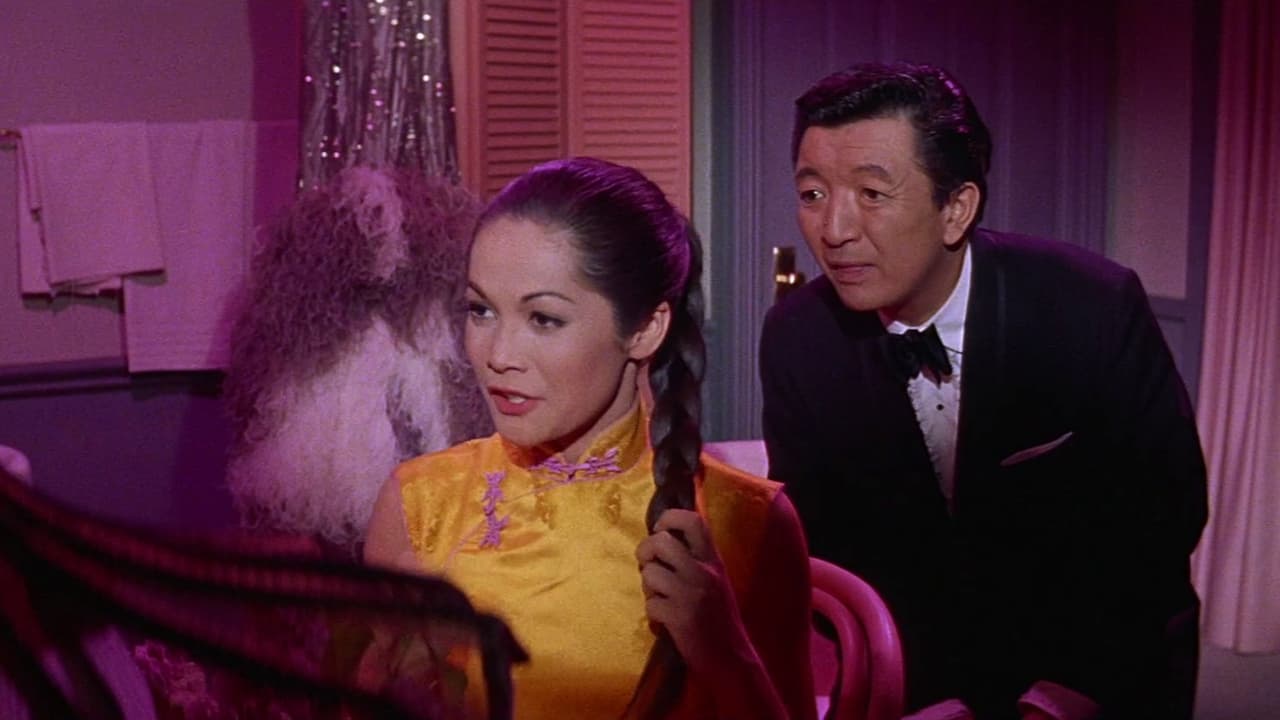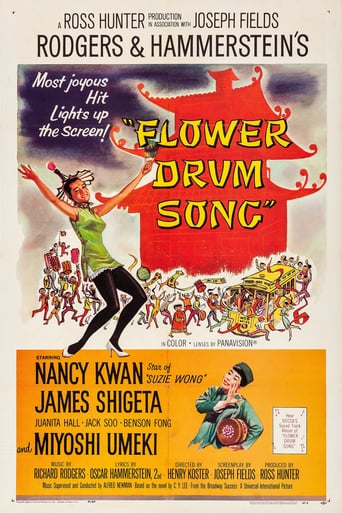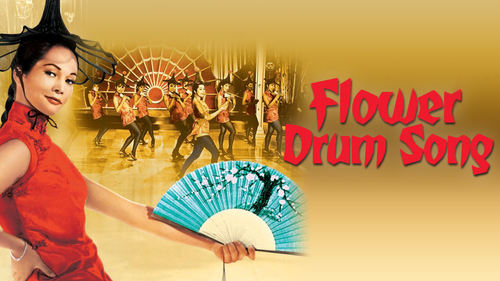



It's a mild crowd pleaser for people who are exhausted by blockbusters.
View MoreThe movie's not perfect, but it sticks the landing of its message. It was engaging - thrilling at times - and I personally thought it was a great time.
View MoreIt is neither dumb nor smart enough to be fun, and spends way too much time with its boring human characters.
View MoreOne of the most extraordinary films you will see this year. Take that as you want.
View MoreHow dated. Sexist. Racist. Stereotypical. Sometimes disgusting in the depiction of Asians coming to America.Adjusting to life in America. Reminds one of the stereotypical Puerto Ricans in West Side Story. America annoying in some ways, they said, but it beats bad conditions in the old country.Jack Soo refreshing to see. Deadpan. Future player on Barney Miller.Women put on makeup. We are no longer 'girls'. We still dress up for "dates", or dress down, for that matter. We don't always enjoy looking forward to living in the home of a free male. Ugh.Too many old movies had Caucasians playing other ethnic types, whether they be portraying Native Americans, African Americans, Asians, et al. This movie mostly had Asian actors, which is somewhat a plus.5/10
View MoreI had originally watched this movie in the '90s when I lived in Jacksonville, FL. So last night, I showed this on DVD with my mom viewing it with me. She had never seen this before so she managed to enjoy it just as much as I did watching this again. During my original viewing, I had a problem with Wang Ta's going from Linda Low to Mei Li since Linda was teasing him and Mei Li was too reticent for my tastes which meant I would have preferred he have gone with Helen. Part of me still feels that way but I'm now used to the way things eventually worked out so I'm now okay with that. Anyway, like I said, I enjoyed this much better the second time around especially with the great look presented on the DVD. Loved the cast of Nancy Kwan, James Shigeta, Miyoshi Umeki, Reiko Sato, Benson Fong, Juanita Hall, Victor Sen Yung, Patrick Adiarte (like me and Mom, a Filipino), and especially, Jack Soo! In fact, one of my favorite sequences was his being knocked out twice in the "Sunday" number! I also loved seeing the cowboy and Indian-in black and white-cavorting with the Technicolor players in that one. Oh, and what a great way in presenting multiple Nancy Kwans in the "I Like Being a Girl" number. The Rodgers & Hammerstein score was really good. Really, all I'll say is I highly recommend this film version of Flower Drum Song.
View MoreSome Rodgers and Hammerstein movies hold up very well today, like "The King and I," some don't, like "South Pacific." This one belongs in the first category. It is beautifully photographed, has an intriguing story, great acting and very good songs and dances.I am not sure that people under 40 can appreciate how unique this movie was. Since the 1970's, everybody has seen Kung Fu and Art movies with all Asian casts. However, in 1961, this film was really the first to show Asia-Americans as real human beings with jobs, families, desires and worries. While there is a touch of a patronizing undertone, the film is generally anti-racist. The audience really care about and relate to the characters.The scene of Nancy Kwan singing to herself in three mirrors wearing a towel is still shocking. It is wrong on so many levels. It is demeaning to both women and Asian-Americans. She is turning herself into an exotic sex toy for men. Yet the scene is equally empowering to women and Asian-Americans. She is embracing her body and her right to be modern and reject stereotypical customs.The film really is Chop Suey, an American invented dish made up of lots of different foods prepared by Chinese chefs. By the end, what is Chinese and what is American is difficult to tell and that's the brilliance of this dish.
View MoreAs a Japanese-American raised in the 1960's, I always had mixed feelings about the 1961 film version of Rodgers and Hammerstein's Chinese-American musical comedy. Although it was refreshing to see so many Asian faces in a mainstream studio movie (granted several Japanese-American actors in Chinese roles), the portrayals always struck me as trite and catering to pre-existing stereotypes. Now that it has finally come out on DVD forty-five years after its initial release, I can appreciate it much more without raising my eyebrows as much, perhaps because it now seems so much a nostalgic product of Eisenhower-era sensibilities. Another reason is that the DVD contains a pristine print that balances the saturated use of color throughout. Moreover, there is the music, which while not grade-A material from the legendary team, has enough of their recognizably melodious style to make the whole affair quite entertaining now.Set in San Francisco's Chinatown in the late 1950's, the soufflé-light story, written by Joseph Fields, is a family-oriented, musical-chairs romantic comedy focused on East-West cultural differences primarily in the well-to-do Wang household headed by the ultra-traditional Master Wang. It starts with pretty Mei Li, who has stowed away on a Chinese steamer with her professor father to become a mail-order bride for nightclub owner Sammy Fong. En route, they end up staying in the Wang home where she develops a crush on eldest son Wang Ta. But he is infatuated with saucy showgirl Linda Low, who is intent on making Sammy jealous enough for him to propose after five years of non-commitment. Wang Ta and Linda turn out to be a mismatch, which would be good news if only Mei Li's marriage contract were not so binding. If that situation is not complicated enough, dressmaker Helen Chao has a lifelong crush on Wang Ta as well.An all-Asian cast was assembled, a rarity in itself back then, and it helps that most perform within the constraints of the movie quite well. Looking like a porcelain doll brought to life, Miyoshi Umeki lends her uniquely plaintive quality to the role of Mei Li, and she sings with quiet clarity on her trademark song, "A Hundred Million Miracles". As Wang Ta, James Shigeta, also a pleasant singer, is sincere with the matinée idol looks to match, although his naïve character seems excessively dim when it comes to women. Both, however, are overshadowed by the shenanigans provided by Nancy Kwan, at her pin-up cutie peak, as Linda, and Jack Soo in full Dean Martin mode as the cynical Sammy. Even though their stormy relationship seems to be lifted completely from Nathan and Adelaide's in "Guys and Dolls", they provide the lion's share of the entertainment with the domestic fantasy, "Sunday" a particular highlight.While dubbed, Kwan performs the boudoir classic, "I Enjoy Being a Girl", with sexy flair, and she dances with graceful exuberance on "Fan Tan Fannie" and especially on "Grand Avenue" with a virtual battalion of dancers. Benson Fong, who memorably played Charlie Chan's #3 son in his youth, brings the necessary bluster to Master Wang, while Juanita Hall, Bloody Mary from "South Pacific", stays mainly on the sidelines as the understanding Auntie Liang except when she solos on "Chop Suey". Of the supporting cast, two performers stand out - teenaged Patrick Adiarte dancing energetically as younger son Wang Tan, and as the lovelorn Helen, Reiko Sato leads a stunning ballet on the show's best song, "Love, Look Away" (her voice is dubbed by legendary soprano Marilyn Horne). The opening credits showcase a series of striking watercolor paintings from artist Dong Kingman, and Russell Metty's richly colorful cinematography can finally be appreciated with the DVD.The 2006 DVD extras are generous starting with a solid commentary track from Kwan and British film historian Nick Redman. Even though Kwan sometimes gets derailed by her life story, she and Redman partner well in bringing out intriguing aspects of the production and cast. There are five featurettes which feel like components of one feature-length documentary since the same participants show up in all five. The first one talks about the story's transition from the original novel by C.Y. Lee to the Broadway musical directed by Gene Kelly to the 1961 movie to the 2002 Broadway revival developed by David Henry Hwang. The other shorts focus on the casting, the score, sets and costumes, and a more personal look at Rodgers and Hammerstein. It's interesting how veteran filmmaker Henry Koster is barely mentioned since he directed the film, though his pedestrian direction is truly the least impressive part of the movie.
View More